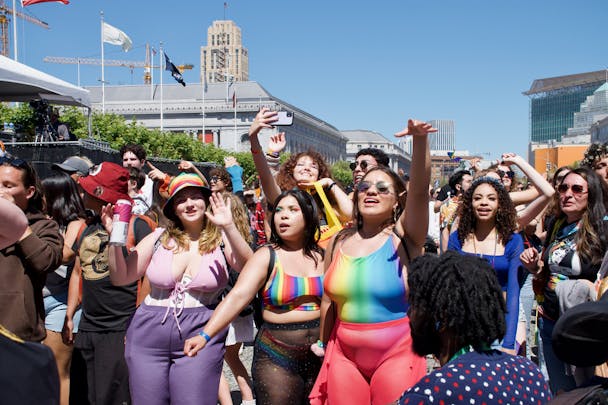Crisis at San Francisco Pride: How Bospar kept the event on the rails despite setbacks
San Francisco Pride and Bospar won the Crisis category at The Drum Awards for PR. Here is the award-winning case study.

Check out the award-winning campaign
OBJECTIVES
Being LGBTQIA+ in America amounts to living in a state of constant crisis. San Francisco Pride wanted this year's Pride to become a defining moment where all Americans, coast-to-coast, declared they were tired of anti-LGBTQIA+ bigotry. SF Pride also had another need: money! The tech ecosystem that funds SF Pride had been hit hard by a recent downturn in the economy. Companies like Google and Facebook faced layoffs, making donating to Pride this year difficult. Bospar developed the following objectives.
ONE: create a rallying cry that will inspire Americans of all stripes to support the LGBTQIA+ cause.
TWO: find a spokesperson with crossover appeal to relay this message.
THREE: leverage the resulting excitement to generate new sources of revenue. Sounds good, right? WRONG!
PR convinced Twisted Sister's Dee Snider to join for a special performance of his hit, "We're not gonna take it." PR reasoned the 80's anthem could bridge straight and gay, just like Snider, who is straight but made his mark wearing women's makeup and clothes during the glam rock era. Snider liked the idea, wanting to take his anthem back from conservatives. He agreed to create merchandise that would help SF Pride realize new revenue opportunities. But 72 hours before our reveal, Snider had a transphobic Twitter conversation with KISS's Paul Stanley about the appropriateness of gender expression in young children. The Advocate reported: "KISS and Twisted Sister Rock Legends Go Full-on Transphobic." Pride's executive director, a trans woman, couldn't work with Snider until we tackled this controversy. We needed to: Respond to the KISS controversy. Pivot to a new PR approach. Continue to raise money.
STRATEGY
Our strategy depended on Dee Snider. If he publicly admitted his error, we could execute our program as planned and possibly deliver better results since we would now have a redemption narrative. If he didn't, that meant a new program. First, we would need to explain our reasoning for dropping Snider from our roster. We would have to communicate in a manner that would ladder up from our core stakeholders to the American public. Many of our board members would delight in "I told you so" moments since they were wary of partnering with a heterosexual rocker with a tenuous connection with our community. A wider swath of Americans, who agreed with Snider's incorrect position, would think the LGBTQIA+ community was uncompromising in our own orthodoxy.
Second, we would need to shift our focus. It would be too late to find a new ally with a new rallying cry. We would need to double down on Pride for Pride's sake. Bridges would have to wait.
Finally, we would need to explain ourselves to our donors. Despite the potential windfall we could have realized from this unorthodox partnership, Dee's uneducated statement was fundamentally at odds with Pride's mission. We would need to make the case that we stuck to our principles and needed a new round of support. To that end, we needed to escalate the stakes. While we didn't want to spook the public from participating, we needed to signal to our donors the very real possibility that we would cancel Pride if we didn't secure sufficient funds. To highlight the drama, we would point out that this would be disastrous to San Francisco's image, since the city was now caught up in a "doom loop" narrative from the economic downturn. The city's biggest mall had just closed along with many downtown retailers. We would make the case that San Francisco needed Pride more than ever.
We originally told reporters to expect a big announcement from Dee Snider on 5/2. On 4/30, Snider and Stanley blew up our plans on Twitter. On 5/1, we told reporters we were delaying our reveal until the 3rd. During that time we tried to convince Snider to apologize. In our last conversation, he admitted that Stanley's tweet cast doubt on young trans people’s ability to self-identify their gender. But he wouldn't apologize or talk to the media. On 5/3, we put out a statement: "We have mutually agreed to part ways, but appreciate Dee seeing this as a teachable moment and a reminder that even allies need to be educated to ensure that they are not casually promoting transphobia. To all our allies – we want to call you in – not call you out." +300 stories published, including The SF Chronicle: "SF Pride says Dee Snider flap drove home pervasiveness of transphobia." On 5/10, we turned the page. Bay to Breakers, SF's oldest race, featured SF Pride's Suzanne Ford as its honorary starter. Without mentioning Snider, local press noted that Ford was the first transgender woman to serve in the role of Pride's executive director. Bospar pivoted to fundraising. AP: "Pride becomes a minefield for big companies, but many continue their support." SF Chronicle: "For the first time, S.F. Pride will request donations from parade spectators." On 6/8 The SF Business Times held its "Business of Pride" event. Bospar contacted the publisher, Mary Huss, asking if we could make the case to the business community. Ford spoke at the event: “We are half a million dollars short. In the next 15 days, I invite you to be on the right side of history.” It was the most important media moment - that hasn’t been revealed until now. While no press mentioned Ford’s comments, her speech worked. Pride got a new line of credit and cash infusions from businesses and the city.
RESULTS
Media reports were unanimous. This Pride showed the best of the San Francisco Bay Area. SFist: "Pride Weekend Comes Off Without a Hitch." Auburn Citizen: "SF Pride festivities help boost local economy." Bay Area Reporter: "SF Pride parade flexes community's muscle." KCBS: "This weekend's San Francisco Pride celebrations to exude both joy and defiance." The media noticed there was more attention and interest in Pride than before. ABC 7's Ken Miguel noted in an email: "We had almost 20K total viewers and more than 405K total minutes watched across our owned platforms—a 77% increase in audience compared to last year's Pride Parade coverage—and our best day of streaming this month!" When it came to fundraising, PR delivered. "[This PR team] has been instrumental in our fundraising efforts, helping us raise approximately $250,000 in just a few weeks during the pride cycle," said Suzanne Ford, executive director of SF Pride. "Their contribution played a significant role in San Francisco Pride's achievement of over $2.1 million in total corporate sponsorships this year.” In 2022, the same PR team took Pride from $100,000 to $1,900,000 in just six weeks, ensuring a turnout of over a million people, despite a controversy that caused other Pride events to disappear. "During Pride weekend, we felt very secure knowing that [this PR team] was in charge of crisis communications," Ford added. "We were in constant contact as events unfolded at the parade and the celebration and I wouldn't want to face that weekend without them." Nguyen Pham, president of SF Pride, added, “[PR's] impact has been significant in enhancing our organization's profile both nationally and, to some extent, globally. [PR] has played an invaluable role in helping us maintain our status as frontrunners in this long standing movement, particularly during this critical moment. Their partnership has been essential in keeping us at the forefront of this important cause.”

